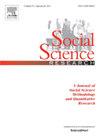青少年早期使用手机是否取代了充实、身体活动和睡眠?时间位移假设的纵向检验
IF 3.5
2区 社会学
Q1 SOCIOLOGY
引用次数: 0
摘要
本研究对时间置换假说进行了实证检验,考察青少年早期使用手机是否取代了用于有利于发展的活动的时间。时间位移通常被认为是手机使用对青少年发育结果产生负面影响的关键机制,但缺乏强有力的实证证据。本研究通过具体的研究设计,克服了以往时间位移研究在方法上的局限。利用来自澳大利亚早期青少年(10-13岁)样本的纵向时间使用数据,结合加权差中差(DID)设计,研究了首次获得手机对各种活动时间分配的影响。研究结果挑战了时间置换假说,没有证据表明青少年在获得第一部手机后,花在充实、体育活动或睡眠上的时间会减少。相反,获得第一部手机与看电视、电影或视频的时间大幅减少有关。这表明,青少年手机使用的历史性增长可能部分反映了传统屏幕活动的转变,而不是对发展有益的活动的取代。家长指南建议较晚的年龄获得手机不太可能影响早期青少年参与非屏幕活动。本文章由计算机程序翻译,如有差异,请以英文原文为准。
Does mobile phone use in early adolescence displace enrichment, physical activity, and sleep? A longitudinal examination of the time-displacement hypothesis
This study empirically tests the time-displacement hypothesis, examining if early adolescents' mobile phone use displaces time spent on developmentally beneficial activities. Time displacement is often considered a key mechanism by which mobile phone use negatively impacts developmental outcomes in adolescence, but robust empirical evidence on this hypothesis is lacking. This study overcomes several methodological limitations of prior studies on time displacement through a specific research design. Using longitudinal time-use data from a sample of Australian early adolescents (ages 10–13) in combination with a weighted difference-in-differences (DID) design, the effect of first mobile phone acquisition on allocation of time to various activities is examined. The results challenge the time-displacement hypothesis, providing no evidence that early adolescents spend less time on enrichment, physical activity, or sleep after acquiring their first mobile phone. Instead, acquiring their first mobile phone is associated with a significant reduction in time spent watching TV, movies, or videos. This suggests that the historic rise in adolescent mobile phone use may partly reflect a shift away from traditional screen-based activities rather than a displacement of developmentally beneficial activities. Parental guidelines recommending later ages of mobile phone acquisition are unlikely to impact early adolescents’ engagement in non-screen activities.
求助全文
通过发布文献求助,成功后即可免费获取论文全文。
去求助
来源期刊

Social Science Research
SOCIOLOGY-
CiteScore
4.30
自引率
4.00%
发文量
0
审稿时长
65 days
期刊介绍:
Social Science Research publishes papers devoted to quantitative social science research and methodology. The journal features articles that illustrate the use of quantitative methods in the empirical solution of substantive problems, and emphasizes those concerned with issues or methods that cut across traditional disciplinary lines. Special attention is given to methods that have been used by only one particular social science discipline, but that may have application to a broader range of areas.
 求助内容:
求助内容: 应助结果提醒方式:
应助结果提醒方式:


